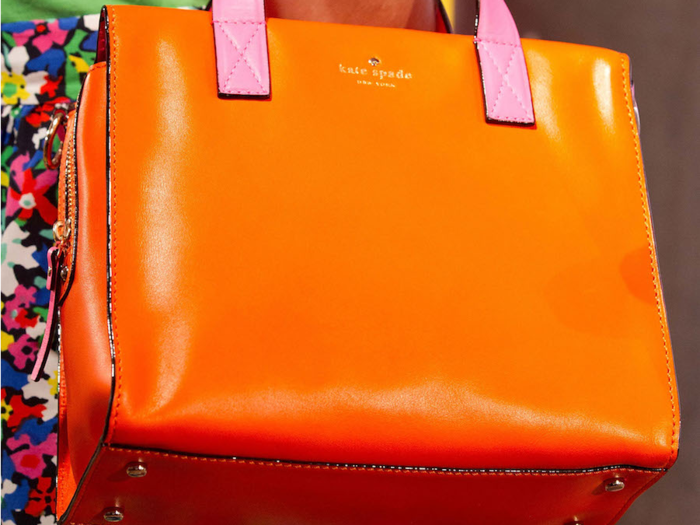- Home
- slideshows
- miscellaneous
- Victoria's Secret got whacked by Trump's tariffs. Here's why fashion stocks are suffering.
Victoria's Secret got whacked by Trump's tariffs. Here's why fashion stocks are suffering.
L Brands

Tapestry

Tapestry's stock has dropped because the owner of Kate Spade and Coach is targeting Chinese shoppers and has warned the trade war is a threat to its business.
The group expects "minimal impact" from the tariff hike last Friday, according to its third-quarter earnings. However, it warned that expanded tariffs — which the Trump administration is already preparing — could have a "more significant impact" on its performance. It added that further escalation could hurt its ability to "grow its business with the Chinese consumer globally" — a key part of its current strategy.
Tapestry earned $672 million or about 15% of its revenue in Greater China — which includes mainland China, Hong Kong, Macau, and Taiwan — in the nine months to March 30. The group also acquired its Stuart Weitzman distributors in Southern and Northern China and took control of its Kate Spade joint venture in mainland China, highlighting its current focus on the region.
3. Abercrombie & Fitch

Abercrombie & Fitch stock is suffering because of the company's reliance on Chinese suppliers.
The apparel retailer sourced about 36% of its merchandise through China last fiscal year, and imported 25% of all merchandise to the US from China, according to its latest earnings report. Recognizing its vulnerability to tariffs, management plans to reduce that second figure to below 20% this fiscal year. They also believe they can shift up to half of their production out of China if necessary.
A&F sees growth opportunities in Asia and Europe, but has warned the trade war could hinder its international expansion. The group earned about $487 million — around 14% of total net sales — outside of the US and Europe last fiscal year. The majority of that probably stemmed from China, given 29 of the company's 57 stores outside the US and Europe were located in the Asian nation as of March 27.
Guess

Guess shares have fallen because higher tariffs threaten to weaken its robust Asia Pacific business.
The apparel retailer expanded from 862 stores and concessions in Asia Pacific to 894 in the year to February, according to its full-year earnings report. More outlets helped to drive sales in the region up 26% to $388 million last fiscal year, outpacing growth of less than 15% in all other regions. Management highlighted accelerating sales and e-commerce momentum in China as key drivers.
"China and Japan are hugely important markets for us with huge white space," CFO Sandeep Reddy said on the group's fourth-quarter earnings call in March. An economic slowdown in China could throw cold water on the group's ambitions.
Ralph Lauren

Ralph Lauren shares have dropped as the US-China trade war threatens to curtail growth in China and Asia more broadly.
The clothing company opened 39 stores in China — its fastest-growing market — last fiscal year, CEO Patrice Louvet said on the full-year earnings call this week. New stores in Shanghai, Beijing, and other Chinese cities drove constant-currency sales in mainland China up more than 30%, sending Greater China revenue up 20%.
Overall Asia revenues of just over $1 billion represented 16.5% of turnover, up from 15% a year ago, according to Ralph Lauren's full-year earnings report. The rising proportion of revenue earned in the region highlights its growing importance to the group.
Tiffany & Co.

Tiffany & Co. shares are under fire because a prolonged trade war could tarnish sales to Chinese shoppers, some of the company's best customers.
The jeweler generated about 17% of its net sales in Greater China last fiscal year, according to its full-year earnings report. It had 33 stores in China at the end of January, more than in any other Asian country. Strong demand in China drove its Asia-Pacific sales up 13%, and its planned launch of a local e-commerce website this year could fuel further growth.
Unsurprisingly, management has called out the US-China trade war as a risk to the business. An economic slowdown in China could hurt sales and profits at stores in Greater China, as well as stores in other territories that serve Chinese tourists.
Chinese consumers spend more on average than Americans, Europeans, and other shoppers, CEO Alessandro Bogliolo said on the group's full-year earnings call. They are "big lovers of gold and platinum, especially with diamonds," he said, pointing to "very strong" sales of engagement rings to them.
If the Chinese economy weakens, their taste for Tiffany's bling could sour.
Gap

Gap's shares have suffered because of the company's dependence on Chinese vendors.
The owner of Gap, Old Navy, and Banana Republic made around 21% of its purchases last year from factories in China, according to its full-year earnings report. Higher tariffs on Chinese imports to the US could ramp up its costs and reduce its profits.
Gap highlighted China as a growth market on its fourth-quarter earnings call. Although it doesn't break out sales for the country, it increased the number of Gap stores in Asia by 19 to 332 last fiscal year, suggesting it's deepening its footprint in China.
However, Gap's Asia revenues amounted to $1.2 billion last fiscal year, or about 7% of overall turnover, meaning its business in the region remains relatively small.
Popular Right Now
Popular Keywords
Advertisement
